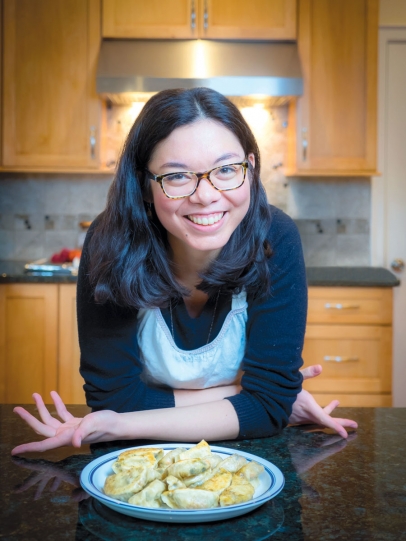Dumplings or Dialect?
Exploring the entangled magic of identity
The kitchen is where I feel most Chinese. It’s where our wok is visible most days a week. It’s where we keep our chopsticks, our different liquid seasonings—fish sauce, oyster sauce, sesame oil—all these tangible implements of Chineseness. And while we have a well-stocked spice cabinet and pantry, full of fenugreek and bay leaves and chickpeas, none of these ingredients evoke the same aha! that’s me associations in my brain. They are remote from myself, just another tool I might use to put together just another meal. When I make pasta, I am looking for quick sensory gratification. When I reach for the soy sauce, I am reaching for my Chineseness, for the comfort of being me.
Some of my most enduring memories are of standing around the kitchen table in my grandparents’ home, pleating dumplings or bao (steamed buns), wrapping rice and meat in bamboo leaves for zong, rolling small balls of dough for a Winter Solstice dish my family calls ee. These foods, many of which are anchored to holidays or contain foods that are only seasonally available, also mark the cyclical passing of time: a constant that evolves in tandem with my skills. (And good thing, too, for if my dumplings remained as limp and ugly as when I first tried my hand at wrapping the unruly things, I think my grandma would have banned me from her kitchen.)
When it—food, an unquestioned identity—is something you grow up with, when it’s stable, it’s not something you think about. Thus it was only when I left that comfortable zone of family that I began to grapple with what it means to be Chinese American.
As families go, mine has always been fairly insular. Until the latter years of high school, I didn’t know many Chinese people outside of my relatives, so I had only one model for what it meant to be Chinese American: my mother’s family. (My father’s family is German American.) Our reunions centered around food and the holidays that were the call to gather. Mooncake for the Mid-Autumn Festival, zong for the Dragon Boat Festival, ee for the Winter Solstice. We spent all year yearning for these foods. Food was how the holidays entered our vocabulary and how we differentiated among them as children. (The Mid-Autumn Festival will always be “Mooncake Day” to us.) Food formed the foundation of what we shared together, as family and as Chinese Americans. Cooking was the way to show not only love, but acceptance, belongingness. To participate in the making of the meal, to dine at my grandparents’ table—this was what it meant to be Chinese.
Language—that is, the Chinese language—was never requisite in my grandparents’ home. It was always food that mattered, that delineated who was in and who was out. I never learned Mandarin because my family doesn’t speak Mandarin. They speak Teochew, a Chinese dialect used by about 0.002% of the world. It is useless just about anywhere in the United States, including the Chinese neighborhoods, where Mandarin and Cantonese are the dominant dialects. Consequently, it was never communicated to me by my elders as an important part of being Chinese. Food was always the key.
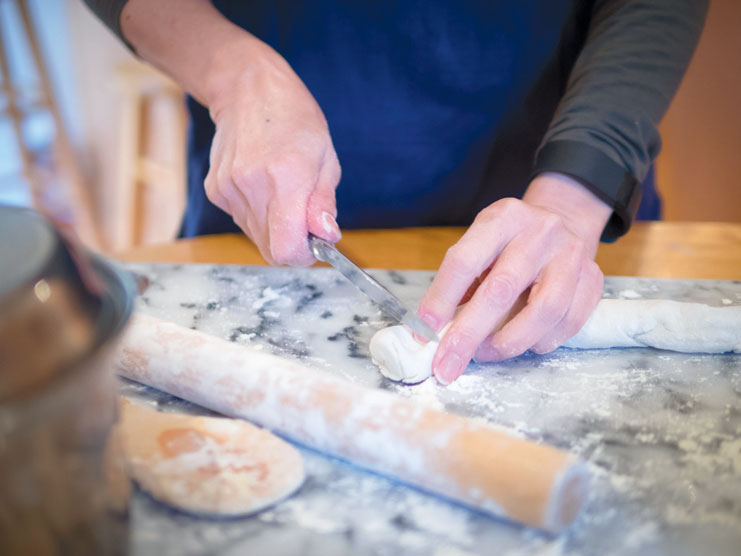
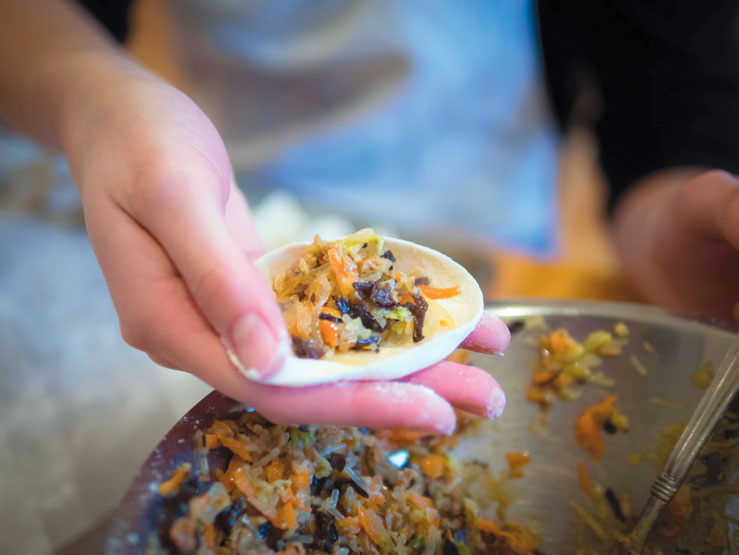
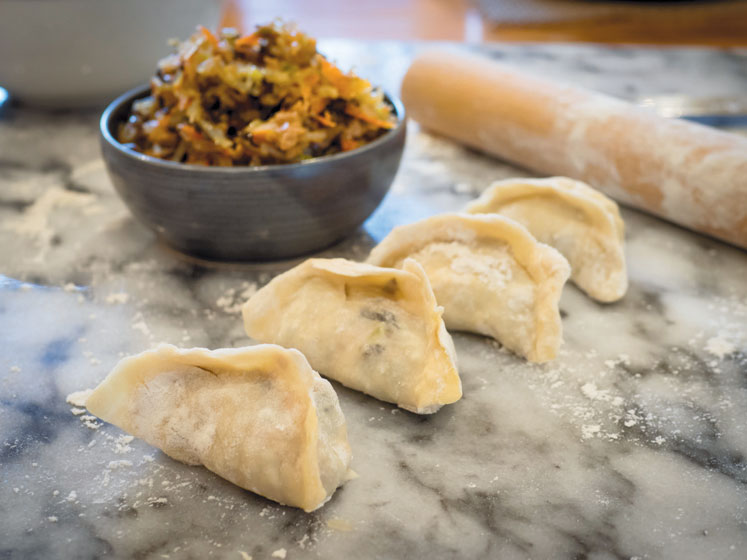
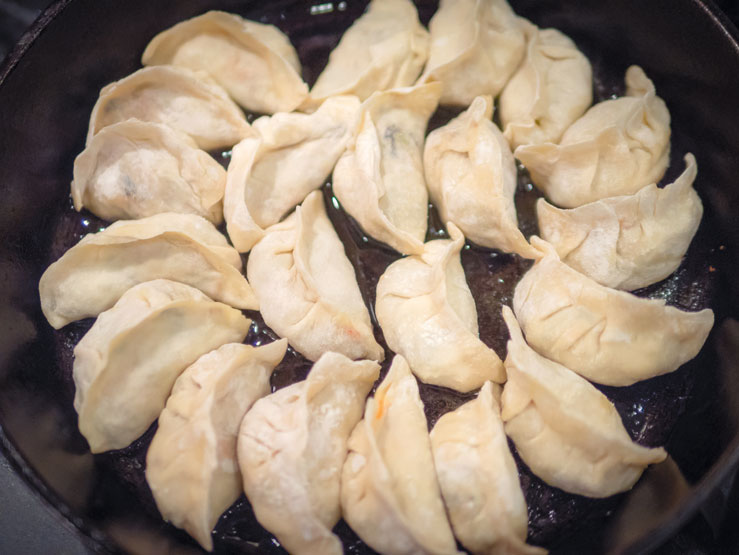
But, I quickly discovered, in the “real world” populated by millions of other Chinese Americans, language mattered. The labor of love represented by a plate of steaming dumplings meant nothing if unaccompanied by a few quips of Mandarin. If I couldn’t speak Mandarin, I wasn’t a “real” Chinese American; I was an Americanized Chinese person. (The horror!)
On more than one occasion, when my family was at a Chinese restaurant and ordered in English because that was our lingua franca, we were snubbed with forks rather than chopsticks. The implicit assumption being: You are too Americanized to handle chopsticks. What we ordered, which might “prove” our familiarity with traditional Chinese cuisine, came after the tableware was set, so what we ordered often seemed less important than how we did so.
The insistence on Mandarin, and the prioritization of that kind of knowledge over other types of cultural knowledge, showed itself in my interactions with some of the snobbier Chinese-Americans I hung out with in my formative late teens. They took one look at my half-Asian features, noted my inability to participate in Mandarin conversations, and lost interest. Like young people everywhere, however, most had no idea how to cook for themselves. Gleefully, I regarded their ineptness in this area: They might outrank me when it came to speaking Chinese, but ha!—I could make a better dumpling.
As petty and defiant as the thought was, it was equally tired and resigned, for what was a dumpling compared to the magic of constructing whole sentences out of thin air?
My mother has felt the same way. Even though she speaks Teochew, she has been told she is “Americanized,” based on her inability to speak “Chinese” with others. Like me, she is confounded when members of that exclusive club don’t celebrate all the holidays or don’t understand the symbolism behind ingredients in common celebratory dishes. How can these bona fide Chinese Americans be so ignorant of something my grandparents always insisted upon?
I see the value of trying (and in many cases, fighting) to maintain linguistic ties to what counts as “back home” for China-born transplants. Language binds communities. But food and cultural celebrations do that, too. Why can’t they count on par with language in this grand cultural push and pull across worlds, places, times?
Inside the safe boundary of family, it was enough to say, I am my mother’s daughter. I am Chinese. But outside, this simple equivalence gave way to a different system, one that relied upon a differential valuation between what we cook, order and eat, and how we do so, and the use of these metrics to determine who is an Americanized Chinese person and who is a Chinese American. How can you be “Chinese” when you speak only English? Have no chopstick skills? Could a love of Chinese food redeem such a soul? Could a preference for “Asian fusion” over “authentic” Chinese food damn it? Could food, as a reason to gather, be reason enough to belong?
While we’re at it, could we perhaps throw food out of the equation?
Because I don’t cook much Chinese food anymore. I have become something of a prodigal daughter. These days, I cook mostly Mediterranean- and Indian-inspired food.
And boy, have people noticed.
They have also noticed (loudly) that I am an aspiring vegetarian (my phrasing).
It was natural for me to gravitate toward Indian food, historically a vegetarian-friendly cuisine. It also happens to be the home cuisine of many of my vegetarian friends.
“How can you be
‘Chinese’ when you
speak only English?
Could a love of
Chinese food redeem
such a soul?”
This is not to say that Chinese cuisine cannot be vegetarian, or that it is an anomaly to be a vegetarian Chinese person. Most Chinese Buddhist monks are vegetarians. Ancient China was the birthplace of tofu and seitan, staples of Chinese Buddhist cuisine; one story even attributes the invention of seitan to a Buddhist monk. My family enjoys plenty of dishes that are incidentally vegetarian—scallion pancakes, scrambled eggs with chive flowers and, one of my all-time favorites, cai bao (vegetable steamed buns). We are supposed to avoid meat and meat products on New Year’s Day. But it is an anomaly to be a vegetarian—even an aspiring one—in my meat-eating, food-loving family. And family is the root of my Chinese identity. I cannot be Chinese without them.
What kind of Chinese am I if I cease to eat the same foods as my family? In a family where food is often equated with love, it is borderline offensive to refuse a dish. Yet, how can I reconcile myself to such family dinners when I feel guilty and somewhat alienated when I have a plate full of meat? And how can I decide to give up the food of my heart?
As time passes, I consume less and less Chinese food. When my grandma leaves this world, Teochew will likely disappear from my ears; we will forget some of the traditions and even superstitions only my grandma seems to know. Some foods we love will no longer be the same without her touch. As these cultural signifiers slip away from me, will my Chineseness likewise fade?
No—they are no less dilute or precious to me because I encounter them less frequently. Easter happens once a year and is no less powerful to those who believe. I can be Chinese by making new traditions, and I can tweak recipes to be more vegetarian-friendly. I do not need to speak Mandarin. I will not be less Chinese for refusing a meat dumpling.
Any biological children I have will, like me, never be 100% Chinese. How will I show them how to be Chinese?
I will start with cooking


